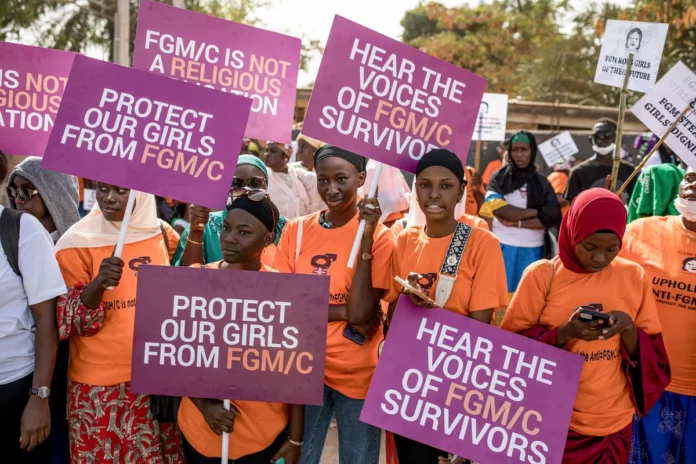By: Michaella Faith Wright
Female Genital Mutilation/Cutting (FGM/C) is a deeply entrenched cultural practice that has significant physical, psychological, and social implications for women and girls in The Gambia. Despite international condemnation and local efforts to eradicate it, FGM/C continues to persist in many communities. This article delves into the complexities of FGM/C in The Gambia, exploring its roots, the challenges in combating it, and the ongoing efforts to protect the rights of women and girls.
FGM/C, often viewed as a rite of passage, is deeply embedded in the cultural fabric of many Gambian communities. It is traditionally believed to preserve a girl’s purity, ensure marriageability, and uphold family honor. However, these practices come at a high cost, inflicting severe pain, long-term health complications, and psychological trauma on countless girls and women.
The immediate health risks of FGM/C include severe pain, excessive bleeding, infections, and even death. Long-term consequences can be even more devastating, such as chronic pain, complications during childbirth, and increased susceptibility to infections. Psychologically, survivors of FGM/C often experience trauma, anxiety, depression, and a diminished sense of self-worth.
In December 2015, the Gambian government took a significant step by enacting a law that criminalizes FGM/C. This legislation, supported by both local and international advocacy groups, marked a milestone in the fight against this harmful practice. However, enforcement remains a significant challenge. Many communities continue to practice FGM/C in secret, and cultural resistance, combined with a lack of resources and awareness, hampers effective implementation of the law.
Efforts and Initiatives
Various organizations and activists in The Gambia are tirelessly working to eradicate FGM/C. These efforts include community education programs, advocacy campaigns, and support services for survivors. Local leaders, including religious figures and elders, are being engaged to shift cultural perceptions and promote the abandonment of FGM/C. Additionally, survivors’ stories are being amplified to highlight the human impact of this practice and foster empathy and understanding.
Education plays a crucial role in the fight against FGM/C. Empowering girls with knowledge about their rights and the harmful effects of FGM/C is essential. Schools and community centers are increasingly becoming platforms for spreading awareness and promoting alternative rites of passage that do not involve cutting. Educating boys and men is equally important, as their support is vital in challenging and changing long-standing cultural norms.
The fight against FGM/C in The Gambia has garnered international attention and support. Organizations such as UNICEF, UNFPA, and various NGOs provide resources, expertise, and funding to local initiatives. International collaboration helps to sustain momentum, bring global best practices to local contexts, and hold the Gambian government accountable for upholding its commitments to end FGM/C.
Conclusion
The journey to eradicate Female Genital Mutilation/Cutting in The Gambia is fraught with challenges, but it is not insurmountable. By combining legal measures, community engagement, education, and international support, significant progress can be made. The voices of survivors and activists must continue to be amplified, and cultural attitudes must shift to recognize the inherent rights and dignity of every girl and woman. The battle against FGM/C is not just about ending a harmful practice; it is about safeguarding the future, health, and well-being of Gambian women and girls, ensuring they can live free from fear and pain.




